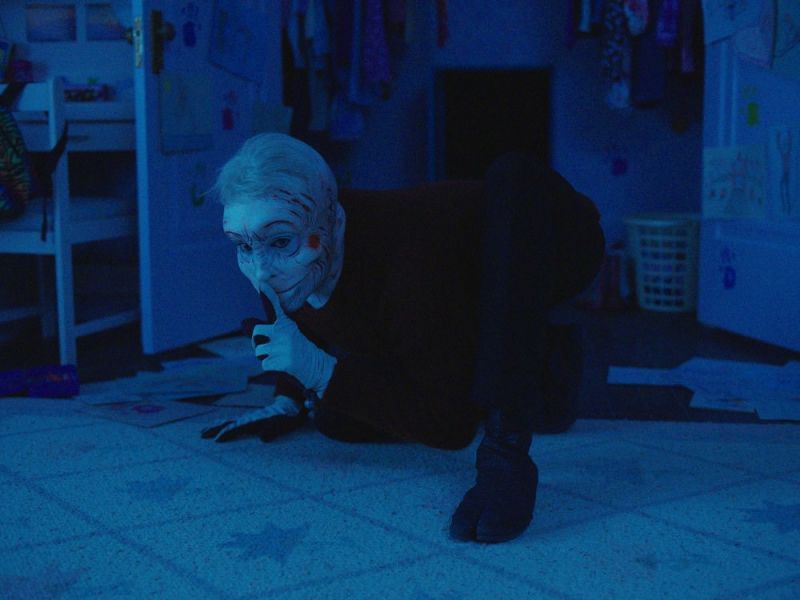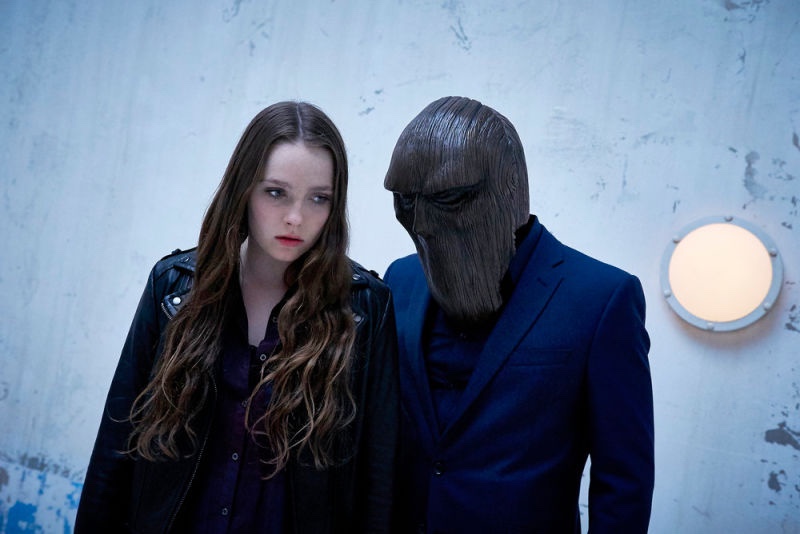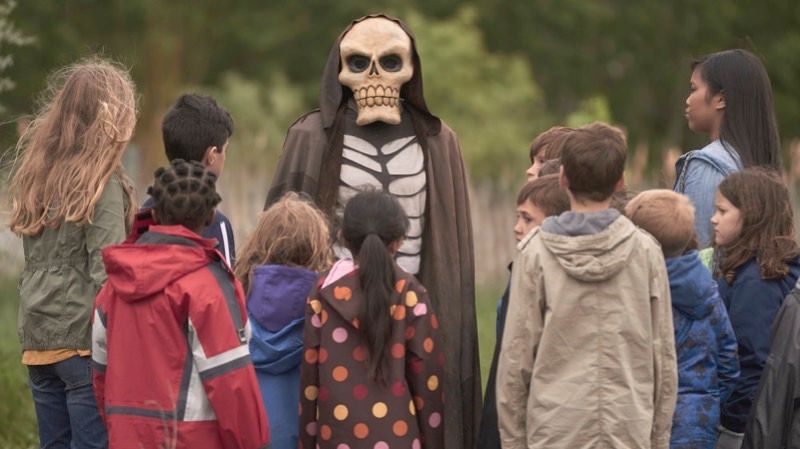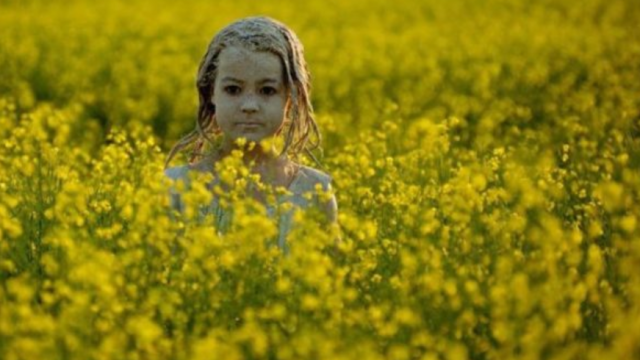Inspired by the eerie, internet-spawned folklore known as Creepypasta, and formatted as compact six-episode seasons, each helmed by a single director, Syfy’s Channel Zero horror anthology offered a uniquely involving viewing experience. Though it was only on the air from 2016-2018, fans are still obsessed.
The guy we have to thank for this is Nick Antosca, the show’s creator and showrunner, as well as one of its writers over all four seasons. Each instalment — Candle Cove, No-End House, Butcher’s Block, and The Dream Door — took its initial storytelling cues from a different Creepypasta story. But this was no straightforward adaptation. From season to season, Channel Zero created worlds that started off “normal” but soon swirled into surreal, terrifying, off-kilter versions of reality. Its characters could be heroic or monstrous, sometimes simultaneously, and each story had deeply flawed main characters who needed to negotiate the show’s more supernatural elements in order to work through their own very heavy real-world stuff.
With Channel Zero now streaming on Shudder, more people have gotten a chance to experience it. We reached out to the busy Antosca — whose other credits include Hannibal, Hulu’s Emmy-winning true-crime limited series The Act, and the upcoming Child’s Play Syfy series, Chucky — for an interview over email about Channel Zero’s lasting impact, and more.
Cheryl Eddy, Gizmodo: Nearly two years after Channel Zero ended, people are still talking about it — there was a lot of love for the show during the recent virtual Shudder panel of horror showrunners at San Diego Comic-Con. In your opinion, what was it about that show specifically that’s made it have such a lingering impact?
Nick Antosca: It’s great that people have discovered it on Shudder. Pretzel Jack [the main creature from season four] and the Tooth Child [season one] made an impression, for one thing. I was talking to Troy James [who played Pretzel Jack] and Evan Katz [director of season four] last week about this. People still send Troy stuff about PJ. They get Pretzel Jack tattoos, etc. It’s fascinating. Some nightmare imagery just touches a nerve. I guess a lot of other people dream about teeth, too.
And I think the character-driven quality of the horror sticks with audiences. A lot of viewers, when I hear them talk about the show now, talk about the grief-horror story of No-End House and the cannibalism-capitalism story in Butcher’s Block.
You can’t engineer it, but I’m really happy that the show has lived on. It’s a testament to all the writers and directors and artists and crew who worked on it, as well as the original Creepypasta authors. It was a really great group of people.

Gizmodo: What was your favourite moment or element from each season?
Antosca: I don’t have clear favourites. But some that I love are Mike meeting the burning Skin-taker played by Olivier de Sagazan in the hallway in Candle Cove. Tooth Child coming to feed in Mike’s dream.
Margot seeing her dead father again at the end of the No-End House pilot. (I like how Cat Power’s “Bathysphere” fit musically at the end of that.) The Father eating the flesh memory of her mother at the end of episode two. Margot killing the Father. Margot and Jules leaving together at the very end.
Every Butcher’s Block moment with Rutger Hauer. Alice ripping the student loan collector’s throat out. Zoe talking to Mr. Peach in the bathtub. Jillian watching Pretzel Jack kill Jason and then do a little dance to make her happy in The Dream Door. Tom and Jillian killing Ian. Barbara Crampton encountering Pretzel Jack in her weird hallway at the end of episode two.
Gizmodo: Though each season followed a different story and was guided by a different director, there was some overlap in all the plots — all four seasons explored the lingering horror of childhood trauma, and all four featured imagery of doors to other worlds or realms of consciousness. Why do you think those became Channel Zero’s recurring themes, and why are these themes instrumental in telling such potent horror stories?
Antosca: It’s a loaded question for me…it wasn’t intentional when we set out to make the show. It evolved that way. Horror can be a very effective way to tell stories of loss and escape. My best friend had killed himself the year before I started first developing the show. I didn’t realise until two or three seasons in that the series was consistently telling stories about accepting death, letting go, and mental health.
And the doors and hallways…yeah, I don’t know. That imagery is creepy and suggestive to me. I’m aware of the pattern now but I wasn’t at first.

Gizmodo: What was it about Creepypasta that made it such a compelling, unique inspiration point during the creation of each season?
Antosca: Each of the stories had some seed that we loved. There are so many of these stories online. They all try to tap into a universal fear, and they all feel personal in the sense that they pretend to be true. So the ones that achieve it touch a nerve. We all have that half-remembered TV show or song from childhood, or something that gets stuck in your head and won’t get out. It’s a rich trove of source material. There’s lots of stories I wish we could’ve done, had the show gone on longer.
Gizmodo: Since Channel Zero, probably your most surprising project has been The Act — surprising since it was more of a true-crime story, though it definitely had some strong horror elements. What was it about that story in particular that inspired you to sort of switch genres?
Antosca: The relationship between Gypsy and her mother, and the uniqueness and tragedy of her coming-of-age experience. A lot of true crime is about investigations, but a story about people who love each other and destroy each other is especially interesting. It was a powerful story.
In my gut, I don’t think of it in terms of switching genres. Similar skills apply. But it’s true that telling a horror story and telling a horrifying story about something that happened to real people is different. Gypsy is a human being, she’s going about her day in prison right now, and she was a victim of dreadful abuse.

Gizmodo: What’s your take on the popularity of true-crime right now?
Antosca: We’re curious about what goes on in our neighbours’ houses. The best true-crime stories humanize people or situations that seem incomprehensible at first.
Gizmodo: The Shudder panel covered the whole “horror on TV vs. horror in the movies” contrast somewhat, but I was wondering if you — as someone who’s mostly known for TV, but also wrote the story adapted into the upcoming movie Antlers — could elaborate on the challenges and also the advantages of spreading a horror story across several episodes, rather than containing it within the runtime of a single movie.
Antosca: I could say a lot about this, and repeat some of what we talked about on the panel, but the truth is — you run toward the light! You write for the medium you have the best shot to get something made in.
That said, yeah, there are advantages and disadvantages. In TV, I like having the space to draw a story out, explore characters more thoroughly, build out subplots and stuff. The challenge is, it’s harder to be scary in TV. Jump scares don’t work as well because they wear out their welcome. Arguably TV is a better place to create a sense of ongoing pervasive dread that can seep into your bones. Mindhunter is a great modern horror show, to me, in that sense. Just the craft that goes into it, the utter sense of dread.
Features, in theory, there’s less space for you to screw it up, and it’s a better place to create a sense of acute fear. So I guess TV is better for dread, movies are better for terror. Also as everybody knows, writers in movies have zero creative control. In TV they do.
Gizmodo: Given the enduring love for Channel Zero, not just among fellow TV showrunners but also fans, and also the fact that the well of Creepypasta inspiration is basically bottomless, is there ever a chance it might return? If that chance presented itself would you be interested in doing more seasons?
Antosca: It’s hard to imagine that it’ll come back. It’s had a healthy second life on Shudder. If they or anybody else wanted to do another season, yeah, I think I’d do it. I have a lot of ideas for seasons that were never made. I also have a lot of concepts where I was like, “I wonder if there’s a Creepypasta that would serve as a good jumping off point to tell this kind of story?” where I never found the right one. And those ideas could end up as features or seasons of a new horror anthology series.
I’ve been writing a lot during the covid-19 production shutdown — basically five months of forced house arrest so far — so I’ve got a bunch of new stuff I’m excited about. In the longer-distance future, I’d love to do a new horror series that takes the ideas and techniques of Channel Zero further. I’d like to keep working with the folks who made the show what it was. And of course, Don Mancini, who worked on Channel Zero, was on that Shudder panel too because we’re doing Chucky now.
Gizmodo: I’m sure you can’t reveal too much about the Chucky series, but whatever you can tell us about where the show is at right now…we’d love an update!
Antosca: Don wrote an awesome show. He’s showrunning it, and he had a great writer’s room. I’m cautious about talking details, but we’re working on it every day. As a Chucky fan, I’ll just say I’m over the moon that Brad Dourif is back as Chucky, as well as some other familiar characters, and that I think fans are going to love where Don is taking it — and new audiences as well. It’s scary, it’s really funny, and it’s very smart. Nobody knows Chucky better than he does, and he’s pushing the boundaries yet again. I can’t wait for everyone to see it next year.
All four seasons of Channel Zero are streaming on Shudder.
